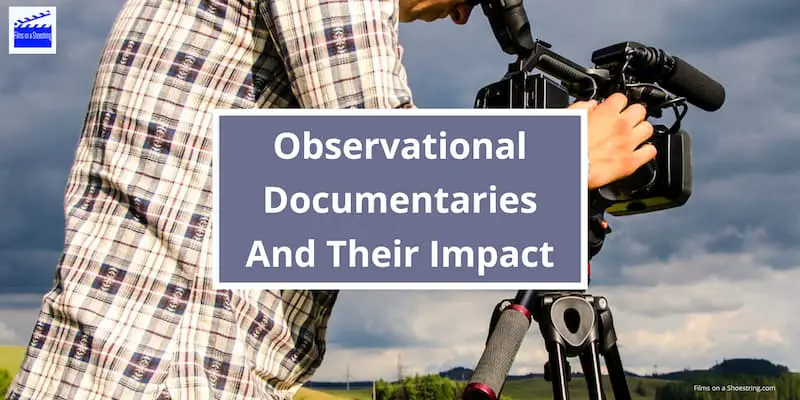Observational documentaries and their impact are an important part of the documentary filmmaking movement.
Observational documentaries have a unique power to captivate audiences and provoke a deep emotional response. These films allow viewers to witness real-life events and people unfold without any interference from the filmmaker.
With their unfiltered and authentic approach, observational documentaries have the ability to create a profound impact and spark important conversations.
Definition of Observational Documentaries
Observational documentaries are films that aim to capture real-life situations and events without interfering or influencing them.
Unlike other documentary styles that may utilize narration or scripted interviews, observational documentaries rely on the observation of subjects in their natural environment, allowing the audience to witness events as they unfold organically.
This unique genre of filmmaking that aims to capture real-life situations and events without the interference or influence of the filmmaker was preceded by two similar, but slightly different filmmaking movements, known as direct cinema and cinema verite.
Characteristics of Observational Documentaries
1. Unscripted: Observational documentaries are characterized by their lack of predetermined script or dialogue. This allows for genuine, unfiltered moments to be captured on camera.
2. Non-intervention: Filmmakers employing the observational style aim to be as unobtrusive as possible, refraining from directing or influencing the events taking place. This approach encourages genuine interactions and an unbiased portrayal of reality.
3. Long Takes: Observational documentaries often rely on long takes to capture uninterrupted sequences of events. This technique helps maintain a sense of realism and allows the audience to become fully immersed in the subject matter.
Purpose of Observational Documentaries
The purpose of these documentaries is to provide an authentic and unfiltered representation of the subject matter. By taking a hands-off approach, filmmakers can document raw emotions and genuine interactions, allowing viewers to form their own interpretations.
The primary goal of observational documentaries is to provide viewers with a deeper understanding of the subject matter and provoke thought and discussion.
Making Observational Documentary
In this video, filmmaker Simon Ford shares his insights and experiences on the importance of effective communication in the filmmaking process and the challenges of communication overload.
Ford emphasizes the need for communication to lead to action and discusses the different relationships between participants and observers in various types of documentaries.
Furthermore, Ford explores the role of the filmmaker in capturing authentic moments and discusses the importance of not becoming the story themselves.
Masterclass: Simon Ford on making observational documentary – Screenskills – YouTube
He shares stories of strategic directing that led to award-winning films and emphasizes the hunger for understanding in storytelling, as well as the duty of care that filmmakers have towards their subjects, particularly in the age of social media and the internet.
Ford emphasizes the long-lasting impact of filming private and difficult spaces and emphasizes the need for channel controllers and commissioners to support program makers in navigating these challenges.
Additional topics covered include maintaining relationships with subjects after production, the importance of building strong relationships and trust with sources, and the potential pitfalls of compromising on access for the sake of securing a commission.
This episode provides invaluable insights into the art of observational documentary filmmaking and the complex dynamics involved in effectively telling stories through the lens of the camera.
Benefits of Observational Documentaries
1. Authenticity: Observational documentaries capture real-life moments as they unfold, presenting an unobtrusive and unbiased perspective. By simply observing without intervention, these documentaries can provide a genuine portrayal of people, places, and events.
2. Emotional Impact: The immersive nature of observational documentaries allows audiences to emotionally connect with the subjects. This deepens the impact of the storytelling and creates a more profound and lasting impression.
3. Societal Awareness: Observational documentaries shed light on important social issues and provide a platform for unheard voices. By showcasing real-life experiences, these films can spark conversations, encourage empathy, and promote social change.
4. Learning Opportunities: These documentaries provide educational value by offering insight into unfamiliar topics or cultures. Audiences can gain knowledge, broaden their perspectives, and develop a greater appreciation for the diversity of the world.
5. Cinematic Freedom: Filmmakers exploring observational documentaries have the freedom to let the story naturally unfold. They can focus on storytelling techniques such as visuals, sound, and natural elements to craft a compelling narrative.
6. Ethical Considerations: The non-intrusive approach of observational documentaries ensures that the subjects’ privacy and dignity are upheld. Filmmakers strive to maintain trust and authenticity while minimizing any potential harm or distortion.
7. Evergreen Appeal: Observational documentaries have a timeless quality that can resonate with audiences for generations. These films capture moments that may be lost forever, preserving them for future generations to learn from and appreciate.
Observational Documentary Movement
The observational documentary movement has gained significant popularity in recent years due to their ability to depict real-life situations and evoke genuine emotions. These films provide an authentic and unscripted view of the world, allowing audiences to connect with the subjects and stories on a deeper level.
The impact of observational documentaries is undeniable, as they have the power to spark conversations, raise awareness about important issues, and inspire social change. By showcasing real people and their experiences, these films create a strong emotional connection and can motivate viewers to take action.
While observational documentaries have had a profound impact on society, it’s important to consider ethical considerations such as maintaining journalistic integrity, respecting privacy concerns, and addressing potential biases or manipulation.
Despite the challenges and limitations of the production process and the subjective nature of the observational style, observational documentaries continue to play a vital role in shedding light on important issues and inspiring positive social change. Their enduring legacy and future potential are undeniable in the world of filmmaking and storytelling.
Observational Documentary Film Examples
Blackfish (2013)
Blackfish is an impactful observational documentary that raised awareness about the impact of captivity on orcas, also known as killer whales, in theme parks.
It highlighted the struggles these intelligent animals face and sparked important discussions about animal welfare and conservation.
March of the Penguins (2005)
March of the Penguins is an impactful observational documentary that highlights the struggles of Emperor penguins in their quest for survival and reproduction in the harshest environment on Earth.
The film beautifully portrays the determination, resilience, and love exhibited by these penguins as they endure freezing temperatures, treacherous landscapes, and long periods of hunger. It showcases the harsh conditions they face in the Antarctic and the incredible lengths they go to protect their offspring.
Through stunning cinematography and a captivating narrative, “March of the Penguins” not only educates audiences about the natural world but also evokes empathy and admiration for these resilient creatures.
Supersize Me (2004)
“Supersize Me” is a documentary that gained significant attention and made a powerful impact by challenging fast-food culture.
Filmmaker Morgan Spurlock’s experiment of eating only McDonald’s for 30 days showcased the detrimental effects of a fast-food diet on his health.
This film sparked conversations and contributed to increased awareness of the importance of healthy eating habits.
Through this film, Spurlock successfully raised awareness about the dangers of excessive fast-food consumption, and sparked discussions about the fast-food industry’s influence on society’s eating habits.
Hoop Dreams (1994)
This critically acclaimed film follows the lives of two African-American high school students pursuing their dreams of becoming professional basketball players.
Through intimate and objective observation, the documentary sheds light on the challenges faced by inner-city youth while providing a poignant exploration of race, class, and the American dream.
Grey Gardens (1975)
This cult classic takes viewers into the lives of Edith Bouvier Beale and her daughter, “Little Edie,” eccentric relatives of Jacqueline Kennedy Onassis, as they live in squalor in their dilapidated mansion. The filmmakers, Albert and David Maysles, capture the daily routines, squabbles, and dreams of these captivating characters, offering a unique glimpse into their complex and isolated world.
History of Observational Documentaries
Observational documentaries have a rich history that dates back several decades.
They emerged as a response to the more formal and structured documentary styles of the past, aiming to capture raw and unfiltered reality.
Nanook of the North, directed by Robert Flaherty was a groundbreaking documentary released in 1922. It followed the daily life of an Inuit family in the Arctic and set the foundation for the genre, although it did include some fictional scenes.
One key milestone in the evolution of observational documentaries was the emergence of the Direct Cinema movement in the 1960s. Filmmakers like D.A. Pennebaker and the Maysles brothers revolutionized the genre by using lightweight, handheld cameras and synchronous sound equipment, allowing them to reduce the size of the film crew and capture spontaneous moments and authentic interactions.
This approach brought a new level of immediacy and intimacy to the films, connecting audiences to the subjects on an emotional level.
Another significant development in the genre was the introduction of cinéma vérité, a style that aimed to capture truth by emphasizing authenticity and naturalism. Filmmakers such as Jean Rouch and Richard Leacock sought to dissolve the boundary between the filmmaker and the subject, immersing themselves in the lives of the individuals they were documenting. This approach often involved extended periods of filming, building relationships of trust and enabling deeper insights into the subjects’ experiences.
This style of documentary filmmaking gained prominence in the 1960s and 1970s when filmmakers started using
Over time, observational documentaries have evolved to encompass a wide range of subjects and styles. Filmmakers use this approach to explore social issues, cultural phenomena, and even personal stories. Notable documentaries like “Hoop Dreams” by Steve James and “Grey Gardens” by the Maysles brothers have touched the hearts of audiences worldwide, offering deep insights into the lives and struggles of their subjects.
Observational documentaries have not only captivated audiences but have also had a significant impact on the documentary genre as a whole. They have pushed the boundaries of storytelling, embracing a more immersive and participatory approach. By avoiding overt narration and relying on actual events and interactions, observational documentaries allow viewers to form their own opinions and interpretations.
Role of Observational Documentaries in Society
Bringing important issues to the forefront
Observational documentaries have the power to bring important issues to the forefront by shedding light on societal problems, injustices, and underrepresented communities.
Through authentic storytelling and compelling visuals, these documentaries can ignite conversations, spark empathy, and inspire action for positive change.
By presenting real people and their lived experiences, these films humanize complex issues and make them relatable to audiences, encouraging them to reflect on their own beliefs and values.
Through these documentaries, important issues have been given a platform and have been able to reach a wider audience, prompting discussions and inspiring social change.
Inspiring social change and activism
Observational documentaries have the power to inspire social change and activism by shedding light on important issues.
These films can spark conversations, raise awareness, and motivate viewers to take action in their own lives or within their communities. By presenting authentic stories and capturing real-life situations, observational documentaries can move audiences to support causes, advocate for change, and work towards a better world.
Here’s a list of how observational documentaries can inspire social change and activism:
- By exposing injustices and shedding light on marginalized communities or underserved populations, these films can ignite empathy and encourage viewers to stand up for human rights.
- Documentaries that explore environmental issues can educate audiences about the importance of conservation and sustainable practices, inspiring individuals to make eco-friendly choices.
- Films that highlight social or political movements can motivate viewers to get involved, join organizations, or participate in activism efforts.
- Observational documentaries focused on health-related topics can raise awareness about public health issues and inspire viewers to take proactive steps towards improving their well-being.
- By presenting personal stories of resilience and overcoming adversity, these films can inspire viewers to take action and make positive changes in their own lives.
Overall, observational documentaries have the potential to be powerful tools for inspiring social change and activism through their compelling storytelling and authentic portrayal of
The Power of Authenticity
Capturing real-life situations and emotions
Observational documentaries have the power to capture real-life situations and emotions, allowing viewers to experience the raw authenticity of the subjects. By not interfering with the events being documented, these films create a genuine connection with audiences, evoking empathy and understanding. Through the intimate depiction of people’s lives, observational documentaries can offer a unique perspective on the human experience.
Creating a genuine connection with audiences
In observational documentaries, the power of authenticity lies in creating a genuine connection with audiences. By capturing real-life situations and emotions, these films offer an intimate and immersive experience that resonates with viewers. Through this connection, audiences can relate to the subjects and empathize with their stories, leading to a deeper understanding and emotional impact. This authenticity is crucial in building trust and engaging audiences in the issues being explored.
Ethical Considerations
Privacy Concerns
When creating observational documentaries, it is crucial to balance journalistic integrity with privacy concerns. Respecting the privacy of individuals portrayed in the documentary while still providing an authentic portrayal is of utmost importance.
Ethical challenges in observational documentaries include:
1. Informed Consent: Obtaining consent from participants is vital to ensure their autonomy and protect their privacy. Filmmakers must clearly explain the purpose and scope of the documentary, ensuring participants fully understand the potential consequences of their involvement.
2. Invasion of Privacy: Balancing the desire for capturing honest moments with respecting personal boundaries can be tricky. Filmmakers must navigate situations where privacy might be compromised, ensuring they respect individuals’ rights to privacy and dignity.
3. Manipulation of Events: Observational documentaries strive for authenticity, but sometimes events can be altered or manipulated due to the presence of the camera or filmmaker’s influence. Filmmakers need to be transparent about their presence and intervention, while maintaining the integrity of the story they aim to convey.
4. Power Dynamics: Filmmakers hold a position of power when documenting others’ lives. It is essential to recognize and address potential imbalances in power, taking steps to minimize exploitation and ensure the well-being of the participants.
5. Post-production Editing: The editing process can significantly impact the narrative and portrayal of individuals in observational documentaries. Filmmakers have a responsibility to maintain the intended integrity of the stories while being mindful of the potential consequences of creative choices.
6. Representation and Stereotyping: Documentaries have the power to shape public perception and reinforce stereotypes. Filmmakers must strive for accurate and fair representation, avoiding sensationalism or perpetuating harmful stereotypes.
It is essential to obtain consent and clearly communicate the intention and goals of the documentary to the participants.
Biases and Manipulation
Addressing potential biases and manipulation is crucial in observational documentaries.
Filmmakers must strive for objectivity, transparency, and ethical storytelling to ensure the authenticity and integrity of their work. This involves conducting thorough research, presenting different perspectives, and disclosing any potential conflicts of interest.
By maintaining journalistic standards, documentaries can be a powerful tool for informing and educating audiences about important social issues.
Challenges and Limitations
Time-consuming and resource-intensive
Creating observational documentaries can be a time-consuming and resource-intensive process.
Filmmakers must spend significant amounts of time observing and capturing real-life situations, often requiring long periods of filming and extensive editing to craft a compelling narrative.
Additionally, the production of observational documentaries may involve significant expenses for equipment, crew, and travel.
Technical challenges include:
1. Lighting: In observational documentaries, capturing real-life moments as they unfold is crucial. However, this often means working with unpredictable lighting conditions. Filmmakers must adapt to natural lighting or use minimal artificial lighting to maintain the authenticity of the scenes.
2. Sound: Sound is a crucial element in observational documentaries, as it helps to immerse the audience in the story. However, capturing clear and high-quality audio in real-life settings can be challenging. Filmmakers may need to use specialized equipment, such as shotgun microphones or wireless audio systems, to ensure that dialogue and ambient sounds are captured effectively.
3. Camera Stabilization: Filming real-life situations often involves capturing footage on the go, which can result in shaky or unstable shots. To combat this, filmmakers utilize various camera stabilization techniques, such as handheld rigs, tripods, or even advanced gimbal systems, to maintain a steady and smooth visual presentation.
4. Access and Permissions: In observational documentaries, gaining access to certain locations or individuals can be a hurdle. Filmmakers must navigate legal and ethical considerations when seeking permissions to film in private or sensitive environments. Additionally, obtaining signed release forms from participants is essential to ensure that their rights are respected.
5. Post-Production Editing: The editing process for observational documentaries can be complex due to the extensive amount of footage captured. Filmmakers must carefully review and select the most compelling moments while maintaining the narrative flow. They may also need to navigate issues related to privacy and confidentiality when deciding what footage to include.
However, despite the challenges, the authenticity and impact of these films make them a powerful tool for storytelling and raising awareness.
Subjectivity of observational style
One criticism of observational documentaries is the subjective nature of the storytelling.
The filmmaker’s perspective and editing choices can shape the narrative and potentially manipulate the audience’s perception.
Additionally, some argue that the lack of a clear perspective or commentary in observational documentaries can make it difficult to delve deeper into complex issues.
However, proponents argue that the authenticity and rawness of this style provide a unique and intimate look into real-life situations.
Exploring Observational Documentaries
Documentaries are a powerful form of storytelling, giving audiences a unique and often up-close look at the events and people that make up our world. While there are many different types of documentaries, observational documentaries are one of the most popular and powerful forms.
Observational documentaries focus on capturing real-world events as they unfold, without the use of narration or interviews. This type of documentary allows viewers to explore the story and events on their own, without any outside influence.
The popularity of observational documentaries has grown in recent years, as audiences are drawn to the unique and unscripted look they offer into the world around us. In this article, we’ll explore the history and impact of observational documentaries, and discuss why they continue to be so popular with audiences.
More for Filmmakers
- Low Budget Filmmaking: More for Less
- Lighting Department Film Roles
- Shooting An Interview
- Documentary Editing
- What is Sound Design in Film?
- Color Grading for Documentary Series or Film
- Film Set Etiquette: Professional Behaviour on Set
- Observational Documentaries And Their Impact
- Essential Skills for Film Industry Professionals
- How to Create a Storyboard in 6 Simple Steps
- What Makes a Film Successful
- Breaking into the Film Industry without Experience
- Sports Documentary Filmmaking
- How to Create a Storyboard Using Sticky Notes
- Remove Background Noise From Video
- Why Do Filmmakers Use Clapper Boards?
- Indie Films
- Indie Filmmaking
- What is Post Production in Film
- Ken Burns Effect: Creating Eye-Catching Sequences





















